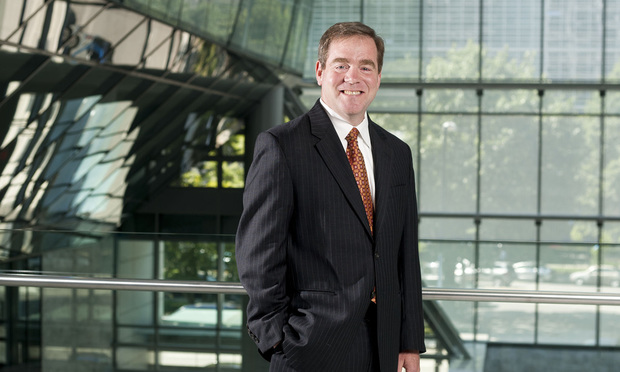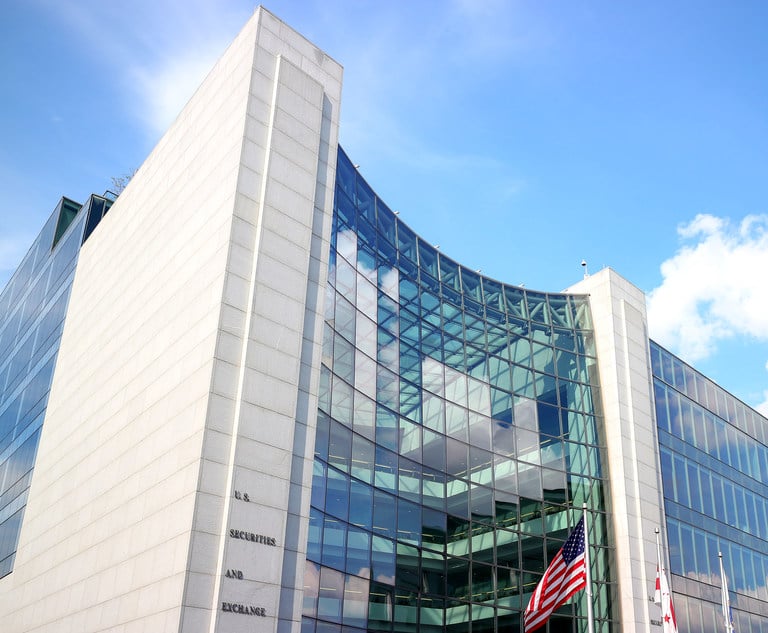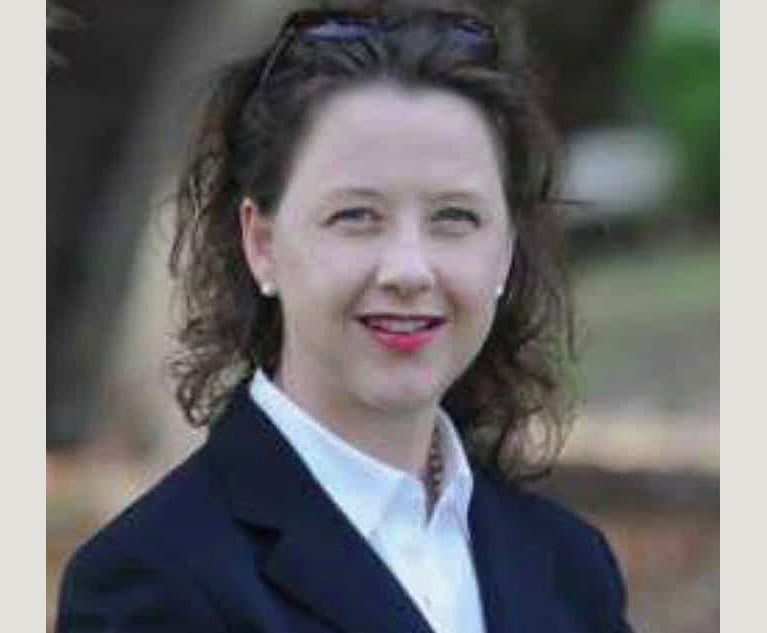Supreme Court Eyes Patent Law's Definition of 'Prior Art'
High court requests solicitor general's views on whether an invention revealed in a patent claim specification—but not the claims themselves—can invalidate a future patent.
October 29, 2018 at 07:45 PM
3 minute read
 David Cavanaugh of Wilmer Cutler Pickering Hale and Dorr. Photo Credit: Diego M. Radzinschi/ALM
David Cavanaugh of Wilmer Cutler Pickering Hale and Dorr. Photo Credit: Diego M. Radzinschi/ALM
The twisting, turning saga of Illumina and Ariosa Diagnostics has taken another detour.
On Monday the U.S. Supreme Court referred an issue from the six-year-old dispute over fetal diagnostics to the Solicitor General's Office for its views, raising the likelihood that it may wind up on the high court's docket next year.
This is not the $27 million patent infringement jury verdict that Illumina Inc. won earlier this year in San Francisco over fetal diagnostics. Rather, it stems from an earlier Patent Trial and Appeal Board decision not to review the validity of one of the patents that underpins the verdict.
Ariosa, which is owned by Roche Molecular Systems, argued that the invention described in Illumina's patent appeared as prior art in a previous patent application—albeit in the claim specification, the portion of the patent that describes the background of the invention, not in the patent claims themselves.
The U.S. Court of Appeals for the Federal Circuit has long held that an invention disclosed in a patent application is not invalidating prior art unless it supports the claims of the patent that issues from the application.
Ariosa and its Wilmer Cutler Pickering Hale and Dorr counsel said this rule allowed Illumina to keep its 7,955,794 gene sequencing patent, “even though it was not the first inventor.” Wilmer partners Thomas Saunders and David Cavanaugh also argue in their cert petition that the federal circuit's rule conflicts with a 1926 Supreme Court precedent.
Ariosa has amicus curiae support from the Electronic Frontier Foundation, R Street Institute and a group of law professors led by Stanford's Phillip Malone. “The federal circuit has departed from the fundamental principle of the patent system: an invention must be new to be patentable,” EFF senior staff attorney Daniel Nazer wrote for EFF and R Street.
Weil, Gotshal & Manges partner Edward Reines argued in opposition that the point is rapidly becoming moot given that the 2011 America Invents Act shifted the patent system from first-to-invent to first-to-file. “Ariosa's petition presents an exceedingly narrow question of rapidly diminishing importance,” Reines wrote. Plus, he argued, the type of informal, nonpublic provision patent application involved in this case was only created by Congress in 1994, and therefore could not have been anticipated by the Supreme Court's century-old decision.
This content has been archived. It is available through our partners, LexisNexis® and Bloomberg Law.
To view this content, please continue to their sites.
Not a Lexis Subscriber?
Subscribe Now
Not a Bloomberg Law Subscriber?
Subscribe Now
NOT FOR REPRINT
© 2025 ALM Global, LLC, All Rights Reserved. Request academic re-use from www.copyright.com. All other uses, submit a request to [email protected]. For more information visit Asset & Logo Licensing.
You Might Like
View All
Hogan Lovells, Jenner & Block Challenge Trump EOs Impacting Gender-Affirming Care
3 minute read
GOP-Led SEC Tightens Control Over Enforcement Investigations, Lawyers Say

SEC Sued for Failing to Reveal Records Involving Simpson Thacher Attorney
4 minute read
Ex-Prosecutor’s Trial Ends as Judge Throws Out Her Felony Indictment in Ahmaud Arbery Death Case
Trending Stories
- 1Judge Pauses Deadline for Federal Workers to Accept Trump Resignation Offer
- 2DeepSeek Isn’t Yet Impacting Legal Tech Development. But That Could Soon Change.
- 3'Landmark' New York Commission Set to Study Overburdened, Under-Resourced Family Courts
- 4Wave of Commercial Real Estate Refinance Could Drown Property Owners
- 5Redeveloping Real Estate After Natural Disasters: Challenges, Strategies and Opportunities
Who Got The Work
J. Brugh Lower of Gibbons has entered an appearance for industrial equipment supplier Devco Corporation in a pending trademark infringement lawsuit. The suit, accusing the defendant of selling knock-off Graco products, was filed Dec. 18 in New Jersey District Court by Rivkin Radler on behalf of Graco Inc. and Graco Minnesota. The case, assigned to U.S. District Judge Zahid N. Quraishi, is 3:24-cv-11294, Graco Inc. et al v. Devco Corporation.
Who Got The Work
Rebecca Maller-Stein and Kent A. Yalowitz of Arnold & Porter Kaye Scholer have entered their appearances for Hanaco Venture Capital and its executives, Lior Prosor and David Frankel, in a pending securities lawsuit. The action, filed on Dec. 24 in New York Southern District Court by Zell, Aron & Co. on behalf of Goldeneye Advisors, accuses the defendants of negligently and fraudulently managing the plaintiff's $1 million investment. The case, assigned to U.S. District Judge Vernon S. Broderick, is 1:24-cv-09918, Goldeneye Advisors, LLC v. Hanaco Venture Capital, Ltd. et al.
Who Got The Work
Attorneys from A&O Shearman has stepped in as defense counsel for Toronto-Dominion Bank and other defendants in a pending securities class action. The suit, filed Dec. 11 in New York Southern District Court by Bleichmar Fonti & Auld, accuses the defendants of concealing the bank's 'pervasive' deficiencies in regards to its compliance with the Bank Secrecy Act and the quality of its anti-money laundering controls. The case, assigned to U.S. District Judge Arun Subramanian, is 1:24-cv-09445, Gonzalez v. The Toronto-Dominion Bank et al.
Who Got The Work
Crown Castle International, a Pennsylvania company providing shared communications infrastructure, has turned to Luke D. Wolf of Gordon Rees Scully Mansukhani to fend off a pending breach-of-contract lawsuit. The court action, filed Nov. 25 in Michigan Eastern District Court by Hooper Hathaway PC on behalf of The Town Residences LLC, accuses Crown Castle of failing to transfer approximately $30,000 in utility payments from T-Mobile in breach of a roof-top lease and assignment agreement. The case, assigned to U.S. District Judge Susan K. Declercq, is 2:24-cv-13131, The Town Residences LLC v. T-Mobile US, Inc. et al.
Who Got The Work
Wilfred P. Coronato and Daniel M. Schwartz of McCarter & English have stepped in as defense counsel to Electrolux Home Products Inc. in a pending product liability lawsuit. The court action, filed Nov. 26 in New York Eastern District Court by Poulos Lopiccolo PC and Nagel Rice LLP on behalf of David Stern, alleges that the defendant's refrigerators’ drawers and shelving repeatedly break and fall apart within months after purchase. The case, assigned to U.S. District Judge Joan M. Azrack, is 2:24-cv-08204, Stern v. Electrolux Home Products, Inc.
Featured Firms
Law Offices of Gary Martin Hays & Associates, P.C.
(470) 294-1674
Law Offices of Mark E. Salomone
(857) 444-6468
Smith & Hassler
(713) 739-1250








